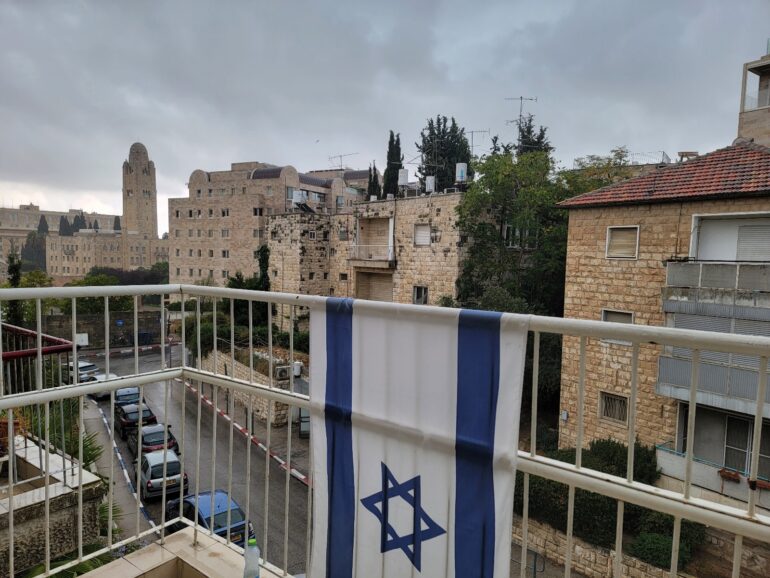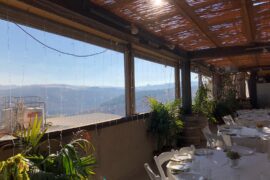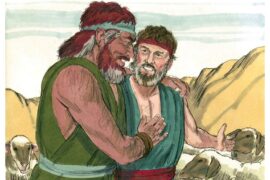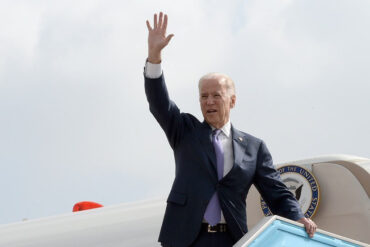As my family approaches Parshat Lekh Lekha, an important milestone appears on the calendar. One year since my pregnant wife and I came home and became Israeli.
I spent years on Canadian campuses sharing the Jewish people’s story, identity and aspirations with the broader activist community. I taught Jewish students how to more effectively tell our story and become characters in this epic chapter of history. Like generations of Hebrews before me, I yearned to return to our land, bi-annually repeating the “next year in Jerusalem” mantra, a shard pierced the pure happiness of my wedding day as I mourned the destruction of our national framework on the ninth of Av. I regularly sang that if I would forget Jerusalem and replace my capital city with another, let me lose the ability to utilize my right hand and tongue.
Our return home was an act of decolonization, not only by physically leaving the land I was a settler in, but also by transcending the worldview of my oppressor and embracing my own people’s ancient collective national consciousness, joining the living people of Israel.
On the 6th of Ḥeshvan of last year, when my family disembarked at Ben-Gurion Airport, we found a country on the verge of complete transformation. A palpable energy of hope in Jerusalem and a tense, demoralized Tel Aviv were about to cast ballots in yet another election. The excitement in Jerusalem around characters such as Itamar Ben-Gvir and Betzalel Smotrich dominated a changing political landscape.
For external observers, the rise of the likes of such “ugly” expressions of Jewish nationalism was merely the next obvious step of a slide towards Israeli fascism. Of course, from within, we could see a different shift in our society. A sector of the Israeli public committed to preserving the parts of our ancient culture and identity that set us apart from the rest of the world showed its electoral strength and a new kind of government was formed.
It didn’t take long before bus ads featuring the faces of our government appeared on busses traversing throughout the country. From Rothschild boulevard to Mea Shearim street to the hills of Haifa, the quiet whisper against the government grew to a loud roar.
On the night that our first child was born, Israel’s internal contradictions burst at the seams revealing a fractured country. A well-coordinated and generously financed protest movement brought the country to the brink. The disunity was so palpable that a serious discourse surrounding a national divorce entered the fray. The protests, backed by American intelligence agencies, engulfed the country for months and barely abated during the short escalation of rockets from Gaza in Sivan.
The government regularly flirted with reneging on the campaign promise to reform Israel’s judicial system, and when further protests ensued, any idea that they were ever about the reforms were dispelled. The country’s dramatic shift signaled the end of the hegemonic Zionist rule, as the protests claiming to stand for democracy aggressively fought the results of a national election.
Our tribalism was as strong as ever, only sharpening the divides within Israeli society. Every Israeli flag being held or waved in the streets painted a picture of a particular worldview, a narrow exclusionary understanding of freedom and equality. Each flag bore witness to their waver’s contribution to the country.
The flag on my porch drooped. The small tears on the bottom, symbolic of the country’s growing pains, appeared to dirty in the wet winter. The stain became only more revealed as both Israelis and Palestinians continued to principally deny the truths in each other’s stories, leading to the murders of Israelis in a Beit Knesset and military raids in Jenin.
Though this was business as usual, Israel’s schisms and identity added a new dimension to these horrors.
Rosh HaShana provided a space to introspect on the year that was and despite the deep division, I could only beam that I had tossed my fate in with the judgement of the people of Israel. I felt that my aliya itself boosted my position entering the new year.
On the pinnacle of the Jewish calendar, on Yom Kippur, the daylight between the camps of Israel appeared to be on full display as public tefilla gatherings were attacked in Tel Aviv. Something about this moment challenged Tel Aviv’s liberalism, let alone Jewish character. The nation’s rift seemed irreparable, the quilt of diversity that makes up the Jewish experience appeared at risk of being torn apart through us repeating ancient mistakes.
Then, on the morning of Simḥat Torah, we awoke to a blaring siren. Nothing would ever be the same. The evolution of the country during our first year as Israelis crystallized and appeared nearly irrelevant.
Living in the Jerusalem bubble that we do, it was the first time that we had ever heard the sirens. We walked with purpose down the stairs, only to find that the shared shelter was locked. As it was Shabbat, we did not yet know the extent of what was happening.
Hoping it was an anomaly, but being prepared for the worst, the building manager found the key to the shelter. We would go down several times throughout the day. Each time, new details of a brutal Hamas attack via ground invasion would emerge in the rumor-spreading shelter. Each one, I hoped, was an exaggeration, a fantasy of a Kahanist glued to their TV, the deep orientalist delusions of a liberal Zionist. Following havdala, I learned the depths of these horrors and it paled in comparison to what we had heard in that shelter.
Over the next few days, we bunked with our closest friends, fearing isolation and potential power loss. In our “war room” we dissected every rumor and news story, making decisions that we would soon see echoed by our political and military leaders.
We saw the impossible happen before our very eyes. The people of Israel’s collective will to fight began to crystalized. From liberal Zionists who typically advocate “peaceful” separation militantly calling to flatten Gaza to Ḥaredi Jews running to enlist in the military, the nation became united.
We commemorated the one year anniversary of our aliya on day 14 of the war. As we watch videos of a united country’s war effort, as we see frustrations mount over the delayed ground invasion, as we yearn to return to Gaza and return the hostages to their families; I think back to the first day I arrived. I remember the burgeoning divisiveness, the young Jews proudly marching with their banners shouting “Only Ben-Gvir”.
I consider the journey that the nation experienced during my first year as an Israeli and I think forward to the next year of my aliya adventure.
How will we transcend the rifts in Israeli society that dominated the news (but were shown to be secondary to something stronger)? How many Jews living in exile will come participate in the story of our people? Now that Israel’s character has shifted, now that war presents an opportunity for revolutionary change, where will we go from here?
Holding this optimism, I think of our deep relationship with this land, the responsibility we have to it and the love we have for it. The land of Israel is not real estate, nor external in any capacity, as HaRav Kook writes in Orot. We are soulmates with the land. In the year that we became Israeli citizens, and decided to raise our family here, Israeli society fiercely debated its identity.
In transcending foreign constructs regarding the relationship between humans and territory, we build a relationship with the land as one does with a soulmate. We do not fall in love and then work to maintain that love, but rather, we make aliya anew every day. We date our soulmate. We court her and we build a meaningful bond.
In the coming year of aliya, I am excited to play as significant a character as I can in this chapter of Jewish history in the land of Israel. I am humbled by the faith that was put in me to live in this era where we have a modicum of sovereignty in the land, but need to advance the liberation of our people.
I invite Diaspora Jews to come join this great story, to not be amongst the 80% lost when we left Egypt and subsequent exiles. I invite you, in the footsteps of our patriarch Avram, to become Avraham – who is told “to leave” and “to come” – to transcend the barriers of foreign ideological paradigms and to participate in steering Israel towards a real and complete liberation.





